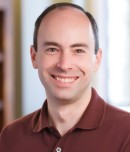

Plenary Lecture
Using Local Feedback Control to Stabilize Global Behavior in Excitable Media

Associate Professor John W. Cain
Department of Mathematics and Computer Science
University of Richmond
Richmond, VA
USA
E-mail: jcain2@richmond.edu
Abstract: If one end of a one-dimensional excitable medium is forced periodically via impulsive stimuli, the usual response is a periodic wavetrain of propagating pulses. When the forcing period is large, the pulses are uniformly spaced and have identical propagation speed. If the forcing period B becomes critically small, the periodic wavetrain may lose stability via a period-doubling bifurcation that occurs at the stimulus site. In certain contexts (e.g., if the excitable medium is cardiac tissue), it is desirable to stabilize the periodic wavetrain solution by perturbing B, adjusting the timing of the nth stimulus by some small amount En. Previous studies have suggested that if the stimuli are delivered at a single point, then stabilization is possible only in some small radius of the stimulus site. In this presentation, I will explain why controlling global spatiotemporal dynamics via locally applied feedback control (i.e., perturbations to B at the stimulus site) is so difficult. Not only does our analysis reveal why traditional feedback control typically fails, it leads to a constructive algorithm for selecting the perturbations En in such a way that stabilization of the periodic wavetrain can succeed.
Brief Biography of the Speaker: John W. Cain graduated from Duke University (Durham, NC, USA) in 2005 with a Ph.D. in Mathematics. Presently, Dr. Cain is an Associate Professor of Mathematics and Computer Science at the University of Richmond (Richmond, VA, USA) and Visiting Associate Professor of Mathematics at Harvard University (Cambridge, MA, USA). Dr. Cain's research lies at the interface of mathematics, biology and medicine, and has been featured in interviews with Science (http://scim.ag/math2heart), the American Mathematical Society (http://www.ams.org/samplings/mathmoments/mm91-heartbeat-podcast), and in the Notices of the AMS (April 2011). In addition to his biomathematics research articles, he has co-authored two textbooks on differential equations, dynamical systems and bifurcations.